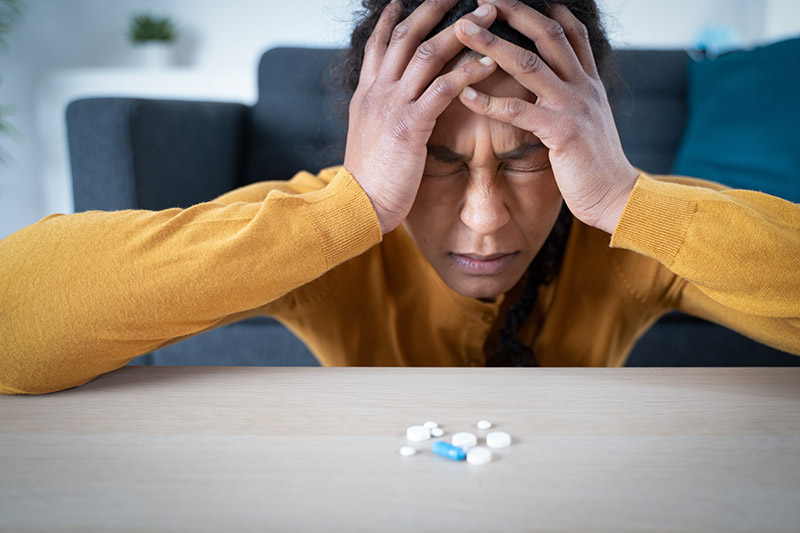Benzodiazepine Detox & Withdrawal
Benzodiazepines are prescribed to help with anxiety, insomnia, assisting with alcohol withdrawal and even seizures. While you are taking benzodiazepines you may feel like you are handling the stresses of your life more effectively, when in reality, you are reacting less dramatically as the medication reduces your awareness of life.
If you suspect that whilst using benzodiazepines you have developed a tolerance to its effects and have started to misuse, abuse, or become dependent on Benzodiazepines, a detox may be necessary.
What is a Benzodiazepines Detox?
Detoxification occurs once the dose of Benzodiazepine that is being taken is below your body’s ‘tolerance point’ or where there is no increase in dosage to your body’s build-up of tolerance to the effects of the medication. (https://www.benzo.org.uk/FAQ1.1.htm#8)
As your body starts to flush out the medication and your body tries to adjust, you may start to experience withdrawal symptoms, sometimes within a couple of hours.
The accumulation of benzodiazepine in the fatty tissues of your body, after a prolonged period of use, may cause some symptoms to only appear over time.

Benzodiazepine Withdrawal Symptoms
Whilst the recommended prescription term is generally less than 4 weeks, you may have been taking this medication for longer or been prescribed a high dosage, leading to the development of tolerance, therefore severity, duration, and type of withdrawal symptoms you may experience depends on the following factors:
- How long you have been taking Benzodiazepines
- Do you only take them occasionally and exactly as prescribed?
- Have you been taking Benzodiazepines for a long time and regularly?
- Age – The older you are the more chance a dependency can occur
- Dosage
Some of the symptoms you may experience are:
- abdominal cramps
- anxiety symptoms (muscle tension, tight chest, fast heartbeat, sweating, trembling or shaking)
- blurred vision
- concentration problems
- dizziness
- pain in your neck or head
- increased sensitivity to stimuli
- no or very low libido
- loss of appetite and weight loss.
- mild to moderate depression
- nausea and or vomiting (being sick)
- nightmares
- panic attacks
- restlessness
- sleep problems
- sore eyes
- sore tongue and metallic taste
- tinnitus (ringing in your ears)
- tingling in the hands and feet (pins and needles)
- unsteady legs
Quitting Benzodiazepines “cold turkey”
Going ‘Cold Turkey’ is when you choose to stop using benzodiazepines without slowly reducing the dose. Using this method of detox from benzodiazepines is extremely dangerous as there are high probabilities and risks for severe withdrawal symptoms.
Quitting too quickly can lead to uncomfortable withdrawal symptoms and the risk of relapse increases
Symptoms may include:
- confusion
- psychosis
- seizures
- a collection of symptoms including a rapid heartbeat, sweating, high blood pressure, tremor (shaking), hallucinations, and agitated behaviour.
Sudden detox or ‘Cold Turkey’ is not recommended especially if you are
- Presenting with an acute emergency problem, the primary problem will be addressed first, withdrawal symptoms will be treated and then you will be referred to further drug services as appropriate
- A pregnant woman – extra caution is needed during this process for the health of both the developing baby and yourself.
- Suffering from a dual diagnosis of benzodiazepine abuse and physical or psychological health problems
- In police custody or short-term remand in a corrections facility, OST will more likely be considered.
How to Detox from Benzodiazepines Safely
Since the severity of your withdrawal can not be predicted, and the difficulty of withdrawing from benzodiazepines, having medical assistance is preferable.
If you require an immediate admission for treatment then a Private Treatment Facility will be able to help, whereas treatment through a charity organisation may take weeks or even months as there is a waiting list.
If you are looking for more information please reach out to us, you can call now on 0333 4444 432
Speak to your GP
Your GP can provide more specific advice on how you can safely detox from Benzodiazepines, if possible, where addiction has not yet developed, a gradual reduction of your dosage may be recommended to help reduce the risk of experiencing withdrawal symptoms.
You may be asked the following CAGE questions to determine your risk of benzodiazepine use disorder:
- Have you felt you ought to cut down on your drinking or drug use?
- Have people annoyed you by criticizing your drinking or drug use?
- Have you felt bad or guilty about your drinking or drug use?
- Have you ever had a drink or used drugs first thing in the morning to steady your nerves or to get rid of a hangover (eye-opener)?
The CAGE questionnaire is a simple screening questionnaire to identify possible addictions to alcohol and has been adapted to include drugs (CAGE-AID)
(https://patient.info/doctor/cage-questionnaire)
An intensive assessment may be needed to tailor a treatment plan to your needs specifically.

If you are Abusing Benzodiazepines
Despite the very legitimate health issues that benzodiazepines are prescribed to treat, chronic misuse or abuse can lead to physical and psychological dependence. This dependence can result in mild, moderate, or even severe withdrawal symptoms, where treatment through a residential rehabilitation centre experienced in safe detoxification followed by therapy, will be beneficial for you.
Medically Assisted Detox
In a medically supervised inpatient detox programme you can receive 24/7 medical assistance to help you through your detox,
A medically assisted detox is advisable especially if you:
- lack the necessary self-discipline to taper yourself slowly and gradually and have no spouse or other caregiver who will manage your taper for you
- If you are abusing other drugs, medications, or alcohol in conjunction with benzodiazepines.
- are suffering from severe or unmanageable withdrawal symptoms and don’t have the support of a caregiver at home to help you.
Clinical experience has shown that most long-term benzodiazepine users feel better after coming off their medication and have reported an improvement in their mood and general wellbeing and a significant anxiety reduction. (https://www.candi.nhs.uk/services/Benzodiazepine-and-Opiate-Withdrawal-Service)
Treating the Underlying Causes of Benzodiazepine Dependence
Since there is a risk that the original conditions for which the treatment with benzodiazepines was prescribed might return, relapse may occur. Treating those underlying causes as well as having a clear plan on how to prevent a relapse is important.
Once your initial treatment (generally a 28-day inpatient programme) has been completed, the need for ongoing support for you and your family is available to facilitate your journey back to living your life free of benzodiazepine.
This is where a Secondary Addiction Care Service can assist you with:
- Reintegration back into your daily life
- Relapse prevention
- Reestablishing a support network within your community and family
- Continuation of therapy
- Rebuilding your daily life skills
https://www.priorygroup.com/addiction-treatment/secondary-addiction-care-service
Antidepressants are also used for the treatment of anxiety disorders, as they carry less risk of addiction.
- SSRIs (Serotonin Reuptake Inhibitors) – Generalised anxiety disorders, panic disorders, social phobia, PTSD & OCD
- TCAs (tricyclic antidepressants) – Generalised anxiety disorders, panic disorders, social phobia, PTSD & OCD
- ACVs (anticonvulsants) – Generalised anxiety disorders, panic disorders, & PTSD
- ANs (atypical neuroleptics) – Acute anxiety, PTSD & OCD
Cognitive behavior therapy (CBT) is a widely used therapy for anxiety disorders, it is effective as a treatment for panic disorder, social anxiety, generalized anxiety, and phobias.
The basic premise of CBT is that your thoughts—not external events—affect the way you feel. In other words, it’s not the situation you’re in that determines how you feel, but your perception of the situation.
Your chances of beating a medication addiction are better with long-term maintenance therapy that includes medications along with some form of counselling or behavioural therapy. This is known as medication-assisted treatment (MAT).

Residential Rehab
Detoxing away from home may be necessary to remove you from the environment in which you were using benzodiazepines.
A residential rehab programme is a private service where you would remain in residence at a treatment centre for the duration of your treatment without the day-to-day stress and responsibilities of life at home.
Delivered in a supportive and holistic environment, residential inpatient rehab aims to identify the underlying triggers or psychological reasons for your addiction.
This is where you will meet with a therapist on a daily or weekly basis, during these sessions, the practitioner will help you look at the nature of your addiction and assess whether pre-existing mental health conditions, hereditary factors, or trauma is contributing to your dependence.
In addition, a medically managed detoxification can help with:
- Alleviating physical suffering.
- Ensuring your body’s safe transition to a toxin-free state
- Reducing mental and physical withdrawal symptoms.
- providing extra nutrients and vitamins to supplement your body
- 24/7 assistance through the detox process as well as supportive care during and after your stay to help you maintain your sobriety.
- Teaching you coping strategies to minimise and manage your cravings
- Keeping you motivated
- Getting your loved ones involved in family therapy sessions that strengthen the whole family as a tool against relapse
- Introducing you to the 12 steps programme and a community support group
A holistic treatment plan where you are considered as a whole is developed with beneficial health-oriented activities incorporated, such as, balanced diets, exercise including yoga, medication, and individualised healthcare that aims to restore your physical, mental, and spiritual connection.
A residential detox is recommended for long-term high dosage withdrawal whilst outpatient care is for shorter-term low dosage withdrawal. (https://pubmed.ncbi.nlm.nih.gov/1675694/)
All residential treatment centres in the UK are regulated by the Care Quality Commission (CQC), the independent regulator of health and social care in England. All centres are individually rated to ensure that they meet the fundamental standards of quality and safety for your care and treatment.
We can assist you with finding the right treatment centre so that you can break away from benzodiazepine addiction.

Outpatient Services
The NHS has options in every local area that can help you with support during treatment, NHS Choices(https://digital.nhs.uk/) maintains a searchable directory of local drug treatment services.
There are often waiting lists to join an NHS outpatient treatment programme, so if you require immediate admission please reach out to us on 0333 4444 432 and we will assist with finding you a private treatment facility in your area.
Considerations before choosing to be treated in an Outpatient capacity:
Pros:
- You can recover at home
- You can continue working during treatment
- You can control your schedule
- It is usually cheaper (or provided by the NHS & charity groups for free)
- Support from family
Cons
- More temptation to relapse
- You don’t get a break from the stressors that initiated your need for benzodiazepines
- You may have little to no support at home to assist between the predefined treatment schedule you have been assigned
- Treatment is less effective in the case of severe use disorder
If you are considering self-detox, you should at a minimum maintain contact with a drug service.
Support groups
The underlying psychological causes for your addiction – childhood trauma, dual diagnosis (anxiety), etc – can be treated with ongoing therapy, and there is a benefit to sharing your journey within a group setting – Narcotics Anonymous or other mutual aid (support group) organisations are free and offer regular meetings in most areas – The UK Public Health has issued guidelines detailing the benefits of supportive treatment – (https://assets.publishing.service.gov.uk/government/uploads/system/uploads/attachment_data/file/669047/Mutual-aid-briefing.pdf)
SMART Recovery UK, is a free, nonprofit, Self Management and Recovery Training programme available to help assist in the recovery process of addiction.
The SMART Recovery approach to recovery is summarised in the Four-Point program.
SMART Recovery teaches how to:
- Enhance and maintain motivation to abstain
- Cope with urges
- Manage thoughts, feelings, and behaviors
- Balance momentary and enduring satisfactions
(https://www.smartrecovery.org/about-us/frequently-asked-questions/)
Online help is also available from http://www.benzobuddies.org/forum/
